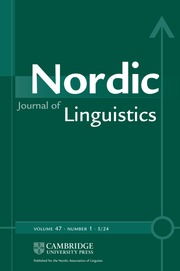Crossref Citations
This article has been cited by the following publications. This list is generated based on data provided by Crossref.
Hrafnbjargarson, Gunnar Hrafn
Bentzen, Kristine
and
Wiklund, Anna-Lena
2010.
Observations on extraction from V2 clauses in Scandinavian.
Nordic Journal of Linguistics,
Vol. 33,
Issue. 3,
p.
299.
Hrafnbjargarson, Gunnar Hrafn
and
Wiklund, Anna-Lena
2010.
AGR and V2.
Theoretical Linguistics,
Vol. 36,
Issue. 1,
p.
57.
Heycock, Caroline
and
Wallenberg, Joel
2013.
How variational acquisition drives syntactic change.
The Journal of Comparative Germanic Linguistics,
Vol. 16,
Issue. 2-3,
p.
127.
Walkden, George
2013.
Null subjects in Old English.
Language Variation and Change,
Vol. 25,
Issue. 2,
p.
155.
Julien, Marit
2015.
The force of V2 revisited.
The Journal of Comparative Germanic Linguistics,
Vol. 18,
Issue. 2,
p.
139.
Yoon, Suwon
2017.
Main Clause Phenomena in Korean (vs. V2 in German).
Lingua,
Vol. 196,
Issue. ,
p.
10.
Caplan, Spencer
and
Djärv, Kajsa
2019.
What usage can tell us about grammar: Embedded verb second in Scandinavian.
Glossa: a journal of general linguistics,
Vol. 4,
Issue. 1,
Gärtner, Hans-Martin
2019.
On the Rich Agreement Hypothesis and varieties of embedded V2.
Nordic Journal of Linguistics,
Vol. 42,
Issue. 02,
p.
209.
Harizanov, Boris
and
Gribanova, Vera
2019.
Whither head movement?.
Natural Language & Linguistic Theory,
Vol. 37,
Issue. 2,
p.
461.
Woods, Rebecca
and
Vicente, Luis
2021.
Metacommunicative-<i>why</i> fragments as probes into the grammar of the speech act layer.
Glossa: a journal of general linguistics,
Vol. 6,
Issue. 1,
Djärv, Kajsa
2022.
On the interpretation and distribution of embedded main clause syntax: new perspectives on complex discourse moves.
Glossa: a journal of general linguistics,
Vol. 7,
Issue. 1,
Woods, Rebecca
2024.
Everyone's been wondering what are the mechanisms for interpreting embedded root clauses in German and English….
Journal of Pragmatics,
Vol. 232,
Issue. ,
p.
4.
2024.
The Unity of Movement.
Vol. 283,
Issue. ,

